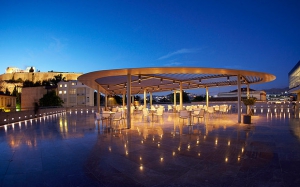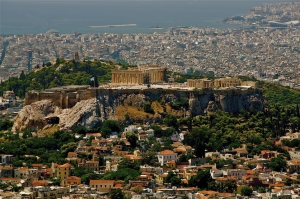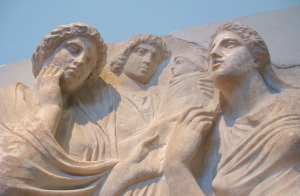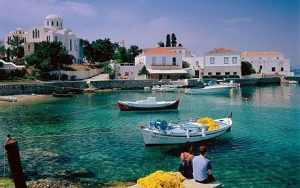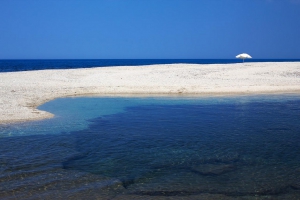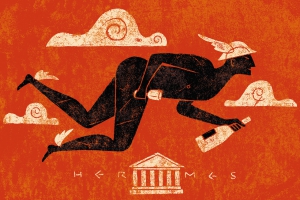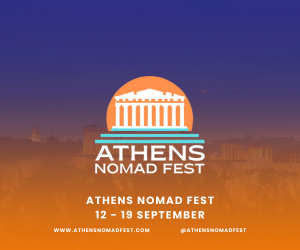LIFE & CULTURE
XpatAthens
Top Museum Restaurants And Cafes In Athens
A welcome retreat from the bustle of a big city can be found in the atrium of the Goulandris Museum of Cycladic Art. Here an elegant and airy little café provides light refreshments with an authentic Mediterranean flavour at tables arranged around a fountain inspired by Cycladic art.
For those exploring the Greek capital with children in tow, the café-restaurant of the Natural History Museum is a godsend. Serving light snacks or full meals this little oasis set in the Gaia Centre has a friendly yet discreet atmosphere and is particularly welcoming to children. The museum is located in the wonderfully leafy centre of the Kifissia suburb, an attraction in itself.
Year Round Tourism For Greece
Niches to Defy Seasonality
The Ancient Greeks’ Six Words For Love
Today's coffee culture has an incredibly sophisticated vocabulary. Do you want a cappuccino, an espresso, a skinny latte, or maybe an iced caramel macchiato?
So what were the six loves known to the Greeks? And how can they inspire us to move beyond our current addiction to romantic love, which has 94 percent of young people hoping—but often failing—to find a unique soul mate who can satisfy all their emotional needs?
1. Eros, or sexual passion
Eros involved a loss of control that frightened the Greeks, which is odd, because losing control is precisely what many people now seek in a relationship. Don't we all hope to fall 'madly' in love?
2. Philia, or deep friendship
The second variety of love was philia or friendship, which the Greeks valued far more than the base sexuality of eros. Philia concerned the deep comradely friendship that developed between brothers in arms who had fought side by side on the battlefield. It was about showing loyalty to your friends, sacrificing for them, as well as sharing your emotions with them. Another kind of philia, sometimes called storge, embodied the love between parents and their children.
3. Ludus, or playful love
This was the Greeks' idea of playful love, which referred to the affection between children or young lovers. We've all had a taste of it in the flirting and teasing stages of a relationship, but we also live out our ludus when we sit around in a bar bantering and laughing with friends, or when we go out dancing.
4. Agape, or love for everyone
The fourth love, and perhaps the most radical, was agape or selfless love. This was a love that you extended to all people, whether family members or distant strangers. Agape was later translated into Latin as caritas, which is the origin of our word 'charity.'
C.S. Lewis referred to it as 'gift love,' the highest form of Christian love. But it also appears in other religious traditions, such as the idea of mettā or 'universal loving kindness" in Theravāda Buddhism.
There is growing evidence that agape is in a dangerous decline in many countries. Empathy levels in the U.S. have declined sharply over the past 40 years, with the steepest fall occurring in the past decade. We urgently need to revive our capacity to care about strangers.
To read this article in full, please visit: Yes Magazine
Five Top Kid Friendly Islands Close To Athens
If you haven’t been to the Argosaronikos Islands and Kea, you’re definitely missing out on a truly unique family holiday, especially as you don’t need to travel far from Athens to find the true beauty of the Greek islands.
Greece's Bathing Waters Of Excellent Quality
Wines That Greece Can Bank On
The wine in question was an Assyrtiko from Santorini. When its identity was revealed, I nearly dropped my glass. Not long afterward I bumped into Mark Squires, who covers the wines of Greece for Robert Parker’s consumer newsletter, the Wine Advocate, and I told him about my experience. “It’s a sleeper,” he said. “No doubt about it. Greece is your classic emerging region. When you look at what is happening in Greece, this is a country that is simply a great wine-producing region—they just don’t have much to prove it with yet.”
By: Will Lyons
Copyright
XpatAthens is a web portal serving the expatriate community, and as such brings together information about expat life in Greece at one convenient source.
All content at XpatAthens remains the copyright of its rightful author. In the case of English translations from Greek sources, the copyright remains with XpatAthens and its publishers. In said cases XpatAthens will have sought the agreement from such media to translate and publish a summary of the Greek language text.
If you believe that your work has been posted online at XpatAthens, or copied in a way that constitutes copyright infringement, or your intellectual property rights have been otherwise violated, please inform XpatAthens with the following:
- A description of the copyrighted work or other intellectual property that you claim has been infringed;
- A description of where the material that you claim is infringing is located on the site;
- Your address, telephone number, and email address.
If an infringement has been made then disputed content will be immediately removed from this site. XpatAthens aims to serve its audience in good faith and in no way wishes to breach copyright in anyway, likewise we ask all our visitors to respect all relevant copyright laws. Thank you.
First Greek Beer And Brewing Museum Opens In Athens
To read more, please visit: Greek Reporter
Location: Athenian Brewery ~ 102 Kifissou, Aigaleo 12241
Visitor Hours: Every Saturday during the month of June from 13:00 - 20:00. Regular operation will begin in September 2015.
The Greek Behind Bulgari
Greek Car Market Reacts Positively To Car Taxation Plans
Market officials said a plan to link car taxation to the car's pre-tax retail price, instead to its power under the current system, is a fair measure, while they positively reacted to plans to change current living standard criteria for the use of cars -considered in some cases to be excessive- and to plans to offer exemptions to circulation fees for cars using the latest environmental friendly technology and fuel.
The Finance ministry plan envisages linking registration fees with pre-tax retail price of a car, which means higher registration fees for expensive cars and lower fees for cheaper cars.
For more, please visit: ANA-MPA


